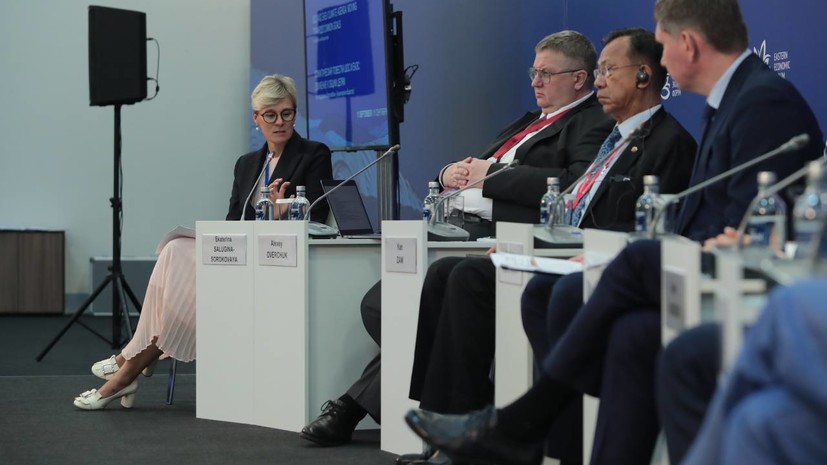Russia should pay more attention to adapting its economy to climate change. This was announced on the sidelines of the VIII Eastern Economic Forum by the head of the country's Ministry of Economic Development Maxim Reshetnikov.
According to him, to date, the world community has thrown all its efforts into the fight against global warming and polluting emissions. At the same time, as the minister emphasized, the climate remains a very inertial system, so the issue of adaptation to changing conditions is also important.
"No matter how hard we try to reduce CO2 emissions, firstly, our capabilities are limited, it's just very expensive at least, and secondly, the climate will still be warmer. The temperature will rise, and from this point of view, we need to pay much more attention to adaptation," Reshetnikov emphasized.
The head of the Ministry of Economic Development urged all countries of the Shanghai Cooperation Organization, the Eurasian Economic Union and BRICS to focus on this topic. Moscow, in turn, intends to argue its position and propose appropriate solutions. For example, Russia is ready to provide its model for forecasting climate change at the international level.
The project was launched on behalf of President Vladimir Putin, and the country's authorities plan to allocate about 10 billion rubles for its implementation. As Maxim Reshetnikov noted, almost all leading institutes and academies of sciences are involved in the initiative. Their task is to create a national system for climate monitoring of greenhouse gas emissions and absorptions, including the absorption capacity of the oceans.
"There is also a large block of economic models that analyze the economic dimension of all climate phenomena ... We are ready to actively offer the results of this modeling, including for other countries, since we have a world model with one resolution, and there is a model of the Russian Federation, adjacent regions with a more detailed resolution, and we are ready, in cooperation with local science, to adapt this model to the needs of a particular country," the minister said.
- The Climate Agenda of the SCO and the EAEU: Moving towards Common Goals
In his opinion, no one can deal with climate issues alone, so Russia offers this form of interaction. However, the primary task in the framework of the joint promotion of the climate agenda within the framework of the EAEU and the SCO should be the mutual recognition of carbon units, the minister stressed.
"In Glasgow (at the UN Climate Change Conference. - RT) was a big step forward, but further from the point of view of specific mechanics we are stalling. Even if we cannot agree on 200 countries, let's agree on 10-20 countries - the SCO, BRICS, and so on - on the mutual recognition of at least the same carbon units and (reduction. - RT) the carbon footprint of products. This will be a giant step forward, on the basis of which we will be able to move on," Reshetnikov added.
It would be possible to accelerate the mutual recognition of carbon units within large economic blocs, among other things, by allowing foreign verifiers to enter the Russian market. This opinion was expressed during the discussion by the first vice-president of Gazprombank Ekaterina Salugina-Sorokovaya.
In general, as the top manager noted, today the EAEU and the SCO are the two largest integration associations in Eurasia, whose spheres of interest largely coincide. Moreover, back in 2021, a memorandum of understanding was signed between the two organizations, which provides for cooperation in the field of finance, trade and customs policy, transport, digitalization and energy. Although the climate agenda is not on this list, the issue of its inclusion in the list is becoming increasingly relevant.
"It is important to note that today the climate is more about the economy than about the environment. Therefore, of course, climate issues today should be included in the list of common topics. And we see that... There are more and more obvious prerequisites for the formation of economic barriers against the background of the development of national climate regulation, and that is why it seems important to us today to talk about the balance of national and supranational in the climate agenda," the speaker emphasized.
A similar point of view was expressed during the discussion by Deputy Prime Minister of Russia Alexei Overchuk. At the same time, as the Deputy Prime Minister emphasized, when promoting the climate agenda and related initiatives in the field of green energy, it is necessary to act in a coordinated manner without unnecessary pressure on the members of the SCO and the EAEU.
"Another aspect related to the energy transition is the promotion of low-carbon development. I would also like to draw your attention to the fact that this should not become an instrument of political pressure and trade barriers. Therefore, there is a need for very well-coordinated actions by all the member states of the SCO and the EAEU at the UN and the WTO. Here it is necessary to develop common approaches," Overchuk explained.

